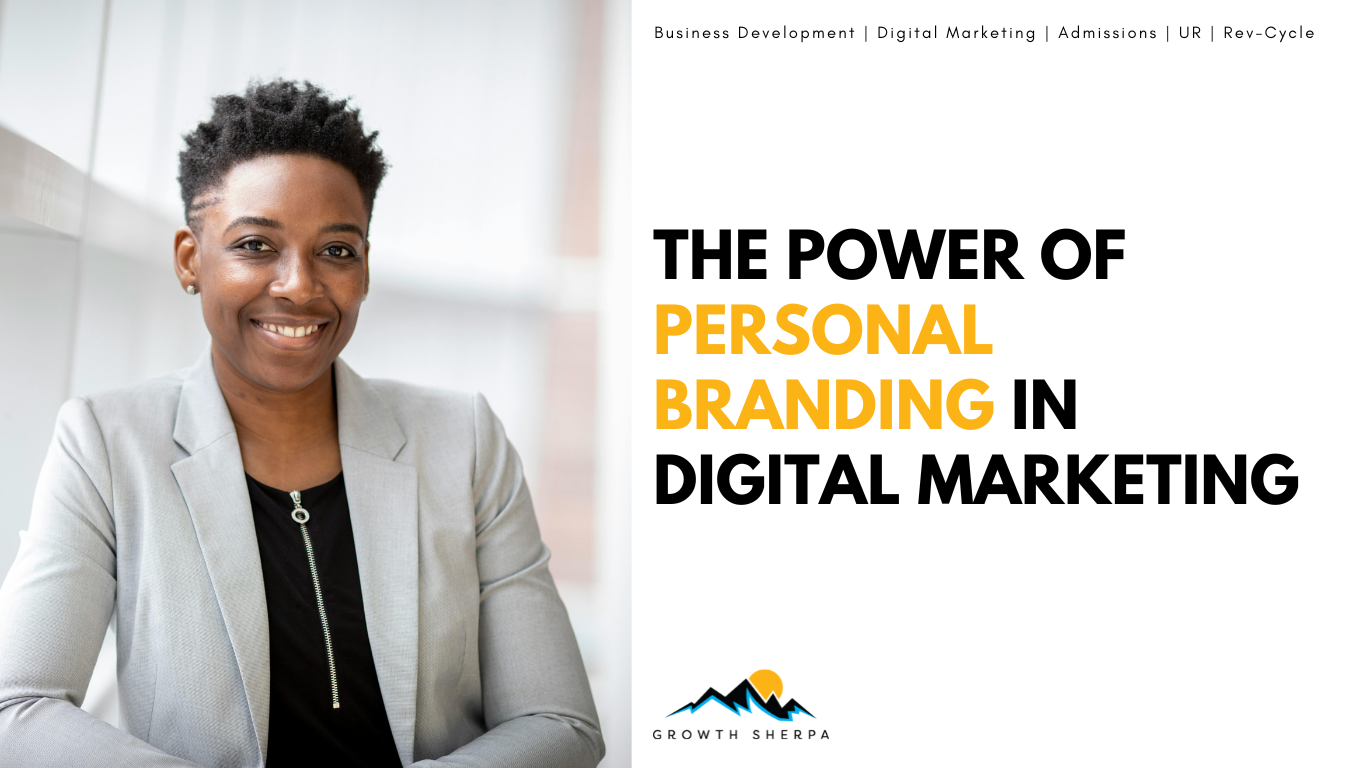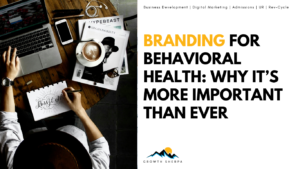In the behavioral healthcare and addiction treatment industry, where trust, credibility, and reputation are essential, personal branding for executives has become an increasingly powerful marketing tool. As an executive in this space—whether leading a single rehab facility or overseeing a network of centers—your personal brand plays a critical role in enhancing the visibility and credibility of your organization.
While traditional marketing strategies like digital advertising, SEO, and content marketing remain important, personal branding offers a unique opportunity to humanize your rehab facility, build deeper connections with stakeholders, and ultimately drive admissions. In this blog, we’ll explore why creating a strong personal brand is an effective marketing strategy for behavioral health and addiction treatment executives, and how it can benefit your facility.
1. Personal Branding Builds Trust and Credibility
Addiction treatment and behavioral health are industries where trust is paramount. Patients and their families are often seeking care during vulnerable and critical moments in their lives, and they need to feel confident that the facility they choose can provide the support and treatment necessary for recovery. A strong personal brand can help you build trust and credibility both for yourself and your facility.
Humanizing Your Facility
While your rehab facility’s corporate brand is important, people connect more deeply with other people than with organizations. By building a personal brand, you humanize your facility and make it easier for potential patients, families, referral sources, and partners to feel a personal connection with the leadership behind the brand.
For example, if you consistently share insights, stories, and content that reflect your passion for addiction treatment, your commitment to patient care, and your facility’s mission, you establish yourself as a trustworthy authority. This, in turn, reflects positively on your organization, making it more likely that people will choose your facility over others.
Becoming a Thought Leader in the Industry
A well-crafted personal brand positions you as a thought leader in behavioral healthcare and addiction treatment. Thought leaders are those who are recognized for their expertise, knowledge, and forward-thinking ideas. When potential patients or partners see that you’re not just running a rehab facility but also actively shaping the industry, it enhances their perception of your facility as innovative, trustworthy, and reliable.
2. Personal Branding Differentiates Your Facility in a Competitive Market
The addiction treatment and behavioral health industries are highly competitive, with many facilities offering similar services. In this crowded landscape, a strong personal brand can help you stand out and differentiate your facility from others.
Highlighting Your Unique Approach
Your personal brand allows you to showcase your facility’s unique approach to care. For example, if you emphasize patient-centered treatment models, cutting-edge therapies, or a strong alumni support program, sharing your insights through articles, videos, and speaking engagements can set you and your facility apart from competitors.
This differentiation is key when potential clients or referral sources are choosing between several treatment centers. They’re more likely to be drawn to a facility led by someone who stands out as an industry expert with a clear, compelling vision.
Enhancing Visibility Beyond Traditional Marketing
While traditional digital marketing efforts—such as SEO, PPC, and content marketing—focus on getting your facility in front of potential clients, personal branding takes this a step further. It enhances your facility’s visibility through professional networks, conferences, and social media channels in a way that is more organic and authentic.
LinkedIn, for example, allows you to build a network of industry professionals, potential referral partners, and even patients’ families who may refer others to your facility based on the credibility you’ve established through your personal brand.
3. Personal Branding Attracts Referral Sources and Partners
Referral sources—such as therapists, hospitals, and outpatient providers—play a crucial role in generating leads for addiction treatment facilities. A strong personal brand helps you develop and nurture relationships with these key stakeholders, ultimately leading to more referrals for your facility.
Becoming a Preferred Partner
Referral sources want to work with facilities that demonstrate excellence in care, leadership, and patient outcomes. When you develop a strong personal brand that reflects these values, you become a preferred partner in the industry. Your insights and thought leadership not only highlight your expertise but also show that your facility is dedicated to continuous improvement and high standards of care.
Building Stronger Connections
A personal brand allows you to connect with referral sources on a more personal level. Rather than being seen as just another executive at a rehab facility, you become a trusted individual in the behavioral health community. By engaging with referral partners through social media, conferences, webinars, or even one-on-one meetings, you foster deeper relationships that can lead to long-term partnerships and consistent referrals.
4. Personal Branding Enhances Recruitment and Retention
Beyond marketing and referral generation, a strong personal brand can help attract and retain top talent for your facility. The behavioral health industry often faces challenges with staff shortages and high turnover, making recruitment and retention critical concerns for executives.
Attracting Passionate, Skilled Staff
When your personal brand reflects a commitment to patient care, innovation, and leadership, it attracts like-minded professionals who want to be part of an organization that shares their values. A strong personal brand showcases your facility as a place where skilled and passionate professionals can thrive. This is especially important for younger professionals who may prioritize an organization’s culture and leadership when choosing where to work.
Fostering a Positive Work Environment
Your personal brand can also play a role in retention by fostering a sense of pride and loyalty among your current staff. When employees see that their executive leadership is engaged, forward-thinking, and committed to the mission, they are more likely to feel connected to the organization and its goals. This creates a more positive work environment and reduces staff turnover.
5. How to Build a Personal Brand as a Behavioral Health Executive
Now that you understand why personal branding is so valuable, here are some key steps to begin building or enhancing your personal brand:
Define Your Brand Identity
Start by defining your personal brand’s core message. Consider the following questions:
- What are your unique values and leadership qualities?
- What makes your approach to behavioral health or addiction treatment unique?
- How do your personal values align with the mission of your facility?
Once you’ve answered these questions, craft a consistent message that reflects who you are as a leader and what your facility stands for.
Engage on Social Media and Industry Platforms
LinkedIn is a powerful tool for personal branding, especially in the healthcare and behavioral health space. Use it to:
- Share original content, such as articles, insights, or videos on industry trends.
- Engage with posts from peers, referral partners, and industry experts.
- Build your network by connecting with other professionals in behavioral health.
Other platforms such as Twitter and Facebook can also be useful for sharing insights and connecting with the broader behavioral health community.
Speak at Conferences and Events
Speaking engagements are an excellent way to showcase your expertise and build credibility. Look for opportunities to speak at industry conferences, webinars, or podcasts where you can share your knowledge and insights.
Collaborate with Industry Peers
Work on collaborative projects with other leaders in behavioral health. This could include co-authoring articles, participating in panel discussions, or even hosting events together. Collaboration increases your visibility and credibility within the industry.
Elevating Your Facility Through Personal Branding
In today’s digital and competitive landscape, building a personal brand as a behavioral health or addiction treatment executive is not just a marketing strategy—it’s a necessity. By establishing yourself as a thought leader, building trust, and creating deeper connections with referral sources and partners, you position your facility for greater visibility, credibility, and success.
At Growth Sherpa, we specialize in helping behavioral health executives develop personal brands that elevate their facilities and drive meaningful results. Whether you’re just starting out or looking to enhance your personal brand, we can help you craft a strategy that aligns with your goals and maximizes your impact. Reach out to us today to learn more!


